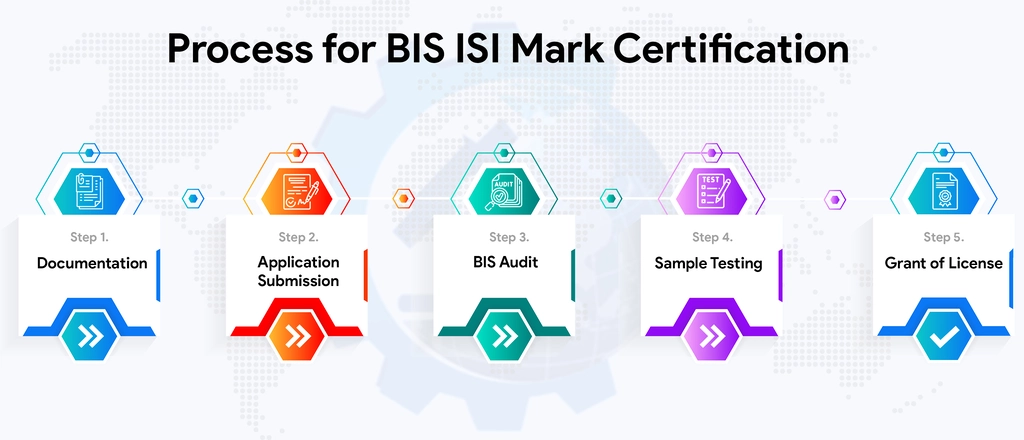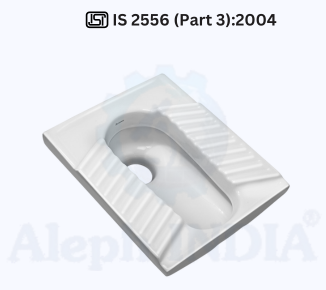BIS CERTIFICATION for Ceramic Tiles, Sanitary Wares, and Laboratory Wares (Vitreous Sanitary Appliances (Vitreous China) - Specific Requirements of Squatting Pans) IS 2556 (Part 3):2004
Published Date: November 05, 2024 4 min Read
Introduction
IS 2556 (Part 3) 2004 is an Indian standard However, it is required in the context of BIS certification for ceramic tiles, sanitary ware, and glass sanitary appliances like squatting pans, which are used in every household and all public toilets in the country. Residence and public toilets are among other end-use applications for squatting pans. These pans are hygienic and comfortable and need quality products, which means strength in the market especially in urban areas.
BIS certification is required to sell such ISI-marked products in India. Thus, the supplier can sell quality products. Companies continue to comply with QCO orders and pay their respective charges for BIS customs clearance for smooth imports.
OVERVIEW
IS 2556 (Part 3):2004 details squatting pans, patterns, sizes, materials, construction, flushing tests, and markings. It refers to other Indian standards concerning flushing cisterns and vitreous sanitary appliances. Matters such as integral flushing rims, pan slopes so flushing occurs, and specified dimensions are outlined. This standard takes pride in the products meeting high quality, hygiene standards, and safety while enhancing manufacturers' ability to meet related health regulations and consumers' needs.
Key highlights
| Product Name | Ceramic Tiles, Sanitary Wares, and Laboratory Wares (Vitreous Sanitary Appliances (Vitreous China) - Specific Requirements of Squatting Pans) |
| Applicable Indian Standard | IS 2556 (Part 3):2004 |
| Applicable Certification Scheme | Product Certification Scheme (ISI Mark Scheme) Scheme 1 |
| Applicable Mark: | BIS Standard Mark (ISI Logo) |
| Compliance Requirement | Mandatory |
| Quality Control Order | Click here |
| Ministry | MINISTRY OF COMMERCE AND INDUSTRY |
| Scope as per Standard | This standard (Part 3) covers the requirements for patterns, sizes, construction, dimensions, finish, flushing tests, inspection and marking for vitreous squatting pans. |
| Major Country of Import | Countries with significant exports to India include China, Germany, and Italy. |
Applicable Tests
Mandatory Tests:
- Glazing
- Lead content (in case colouring oxides containing lead is used)
- Permissible blemishes or defects
- Minimum thickness
- Warpage
Optional Tests:
- Material and Manufacture

Note
For Detailed Information about the Procedure for BIS ISI Certification, Visit :
Timeline for BIS Certification
The approximate timeline to obtain BIS certification for Ceramic Tiles, Sanitary Wares, and Laboratory Wares (Vitreous Sanitary Appliances (Vitreous China) - Specific Requirements of Squatting Pans) IS 2556 (Part 3):2004 is as follows:
- For Indian Manufacturers (Standard Timeframe – 30 days)
- For Foreign Manufacturers (Standard Timeframe – 180 days)
Benefits of BIS Certification
BIS certification helps businesses by improving product credibility, building consumer trust, expanding market access, and giving manufacturers a competitive advantage.
| Benefit | Description |
|---|---|
| Access to the Indian Market | BIS certification is needed for many products to enter and trade in India easily. |
| Compliance with Indian Standards | It ensures products meet national safety and quality standards for consistency and reliability. |
| Enhanced Product Credibility | Certification shows that a product is of high quality, helping it stand out in the market. |
| Increased Customer Trust | Consumers prefer certified products, knowing they meet strict safety and performance standards. |
| Benefits for MSMEs | Small and medium businesses gain a competitive edge and access to government contracts with BIS certification. |
Conclusion
BIS certification is vital for quality assurance and growth in the Indian market. ALEPH INDIA helps manufacturers obtain this important certification.
Aleph INDIA has been serving the industry as a single-window operator for all product regulatory compliance. We can assist importers or manufacturers in meeting all criteria for importing or selling a product in the Indian market.
Frequently Asked Questions
International Audits & Participation
Testimonials
BIS REGISTRATION FOR ELECTRONIC & IT PRODUCT
In the era of globalization, world trade is growing rapidly and henceforth, Manufacturing and Import/Export businesses are also growing drastically...View More
BIS CERTIFICATE FOR FOREIGN MANUFACTURER
The Economy of India-the fastest developing economy on the globe with the capabilities that help it matches up with the biggest international...View More
PRODUCT CERTIFICATION SCHEME (ISI MARK) FOR DOMESTIC MANUFACTURERS
Anything a person buys from food to cars, clothes to electronics, branded to unnamed products there is always a question that wanders in one’s...View More
WIRELESS PLANNING AND COORDINATION (WPC)
WPC: Wireless means communication done from one point to another point without the wires and cables. Electromagnetic waves carry the ...View More
BUREAU OF ENERGY EFFICIENCY (BEE) CERTIFICATE
BEE CERTIFICATE: Energy is the future, and its conservation is the way of the bright future. Everyone claims the environment is important...View More
E-WASTE MANAGEMENT
E-waste is one of the world's fastest-growing trash streams. We currently manufacture almost 50 million tones of it each year...View More
View All Services
Request a call back.
Would you like to speak to one of our Senior Technical advisers over the phone? Just submit your details and we’ll be in touch shortly. You can also email us if you would prefer.






























